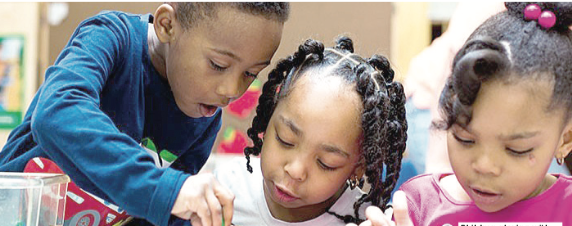Allowing children to be children

Recently, I came across a picture of two toddlers who had torn several packets of noodles and placed them in a bath tub. The noodles were literally soaking in the bathtub. The innocent children seemed to be having fun, just mindful of their business and didn’t know what they were doing was wrong.
It reminded me of Nairobi Governor Johnson Sakaja’s little daughter who stole the show at her father’s inauguration ceremony that was held recently.
The little girl looked confident and enjoyed playful moments at the venue next to President-Elect William Ruto and outgoing Nairobi Governor Anne Kananu.
She was attracted to the yellow and green ribbons and kept on playing with them. At some point, the governor paused his speech and talked candidly about his daughter, comparing her to his mum.
“My daughter is just like my mum. She is really enjoying… dancing. One day she will watch this,” Sakaja said as the unbothered girl continued to play.
Toddler moments
The child’s behaviour drew a lot of reactions from different people. While some felt that she was just a child and through play she was having fun, others felt like she was “out of control” and something needed to be done to calm her and make her sit still.
Many parents get frustrated by their children’s lack of self or impulse control, especially in public. There are a lot of things toddlers do that some adults/parents may not view as pleasing. But for others, a child is just a child and they should just be allowed to be.
“I have a daughter who is two and a half years old and a son who is one year old. There are days I want to scream my lungs out because they do all crazy stuff that you can imagine—from scattering their toys and cushions just after you have cleaned up the house, picking up the remote after you have told them not to touch it because they will end up dropping and damaging it, to splashing water they may find in the bucket since they love playing with water. I have had to be careful on how I store water to avoid any accidents,” says Malia Kerubo.
“These are typical toddler moments that leave me exhausted at the end of the day and desiring a lot of hugs. It gets even crazier whenever we are in outdoor spaces, in places such as church, where it’s hard to control them. When I decide to go to church, I will have to sit with them at the children’s room to avoid too much drama. At the end of the day, I tell myself that they are still children, let them play and enjoy because one day, they will outgrow it,” Malia adds.
Unrealistic expectations
Susan Catherine Keter, a transformation life coach says a child is not an adult. “It is unrealistic to expect a child to sit in an adult event for hours listening to speeches that she has no capacity to comprehend. It is simply not possible. Why do you think that places of worship such as churches have Sunday School for children, which is taught differently from the adult service? Why do you think that teaching methods at kindergarten level vary from those used in secondary school or college? Why do places frequented by families have bouncing castles and other games tailor-made for children?” she poses.
She adds that taking children to an adult event without ways to keep them engaged could be compared with an adult being made to sit for hours listening to speeches spoken in a language he or she doesn’t understand. It is torture, she says.
We all want to be the best parents we can be for our children, but there is often conflicting advice on how to raise a child who is confident, kind and successful.
“Parenting styles are highly contentious issues. While some are traditional and are applauded by many because that is how we were “wired” growing up, we have to be careful to weigh the pros and cons of the parenting style to the child (ren),” says Mercy Amuguni Masiga, a Play and Art Therapist.
Have safe boundaries
The expert explores three main parenting styles; authoritarian, authoritative and permissive. “Authoritarian parenting refers to the extremely strict parenting. It is the traditional parenting that most of us identify with, that children are to be seen, not heard. It is an extremely controlled kind of parenting where children are strictly expected to behave in certain ways at certain times. While it gives a picture of excellent parenting, it has major flaws. Firstly, it inhibits creative thinking, decision making and proactivity in children. Second, it creates a lot of anxiety and fear that can later end in depression, and third it creates a barrier between children and their parents making it hard for children to receive affection,” Mercy explains.
On the other hand, permissive parenting is the opposite. Children do what they want when they want and parents always give in to their demands.
“This comes with its downsides since the children grow confident, but entitled and unable to handle challenges in life,” she says.
For the authoritative style of parenting, children grow within boundaries, but with responsive parents. “This parenting style borrows the positives from other two and discards the negative. Whereas children are brought up with a lot of expectations, parents’ guide, listen and love them while directing them,” adds Mercy.
She notes that children should be allowed to be their age and personality within safe boundaries. “In official, but supported family events (such as the governor’s swearing in ceremony) children can be allowed to be as long as they do not interfere with the programme and do not disturb the participants. Letting a child interact with people helps boost confidence,” she says.
There is need for parents to understand their children’s personality and social needs to help them assess their reactions in public functions.
Mercy offers:” When children are hungry, sleepy or scared, they may be irritable and may in turn disrupt an event and make it hard for even the parent to react. Know if your child is triggered by crowds, for example—will they interrupt the programme? Will they turn the function unmanageable? If yes, maybe crowds is not their safe space. Are they able to play calmly, quietly in a filled up space or do they need an open space for play and running? Some churches have rooms for parents with small children. I have personally used them as this has provided a safe space for my children to play on the floor and given me as a parent a chance to focus on the sermon.”
Beyond getting dirty and having unstructured play time, the expert says it’s vitally important for children to be around adults who accept them for who they are.












